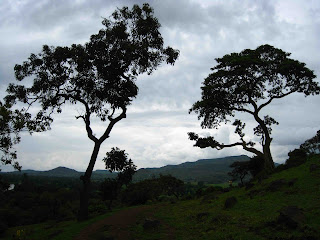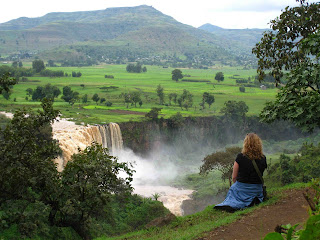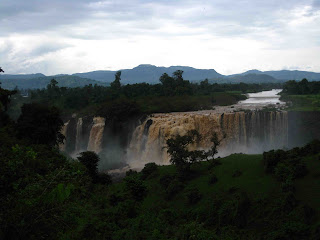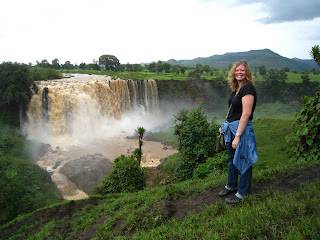By Kristen
I love spontaneous trips and when a friend from a German NGO invited us to join her on a short road trip to Blue Nile Falls, I couldn’t resist. Traveling in a private vehicle is a true treat and one would be crazy to pass the opportunity up! 
 The Blue Nile Falls are located just south of Bahar Dar, northern Ethiopia, and used to be quite the destination. Lately, however, the falls have gotten a bad rap due to the construction of a hydro-electric plant, which diverts nearly 95% of the water. The locals have always referred to the falls as Tis Abay (Smoke of the Nile) because of the spray that clouds the air as the water thunders over the falls. Nowadays that name might not be so fitting. In fact, my fabulous Bradt Ethiopia guidebook refers to the falls as THE CLIFF FORMERLY KNOWN AS THE BLUE NILE FALLS.
The Blue Nile Falls are located just south of Bahar Dar, northern Ethiopia, and used to be quite the destination. Lately, however, the falls have gotten a bad rap due to the construction of a hydro-electric plant, which diverts nearly 95% of the water. The locals have always referred to the falls as Tis Abay (Smoke of the Nile) because of the spray that clouds the air as the water thunders over the falls. Nowadays that name might not be so fitting. In fact, my fabulous Bradt Ethiopia guidebook refers to the falls as THE CLIFF FORMERLY KNOWN AS THE BLUE NILE FALLS.

 Given all of this information, I went with ZERO expectations. Thunderous or not, it was an opportunity to see a new part of the country. Much to my surprise, I was pleasantly surprised! Of course, I have nothing to compare the falls of now with the falls of yesteryear, but I found them to be impressive. It’s not Niagra, but Tis Abay is beautiful in its own way. Just the sound of moving water was music to my ears.
Given all of this information, I went with ZERO expectations. Thunderous or not, it was an opportunity to see a new part of the country. Much to my surprise, I was pleasantly surprised! Of course, I have nothing to compare the falls of now with the falls of yesteryear, but I found them to be impressive. It’s not Niagra, but Tis Abay is beautiful in its own way. Just the sound of moving water was music to my ears.
On our hike up to the falls, we walked through a very tiny village that was lined with handcrafts for sale and manned by “less than bashful” children. In fact, I’m pretty sure that these children must have taken “Entrepreneurship 101” at the local school because they had their spiel down to a science. We heard a chorus of, “My name is Tigist/Hannah/Mehiret. I go to school. You will buy from me when you turn back. I wait you here. My name, again, is Tigist/Hannah/Mehiret.” Given that it had started to rain on the return hike we didn’t know if the “I wait you here” promise would still apply, but rain is not a deterrent for these little businesspeople. As we came in sight of the village, we heard the patter of running feet and the cries of “you promised to buy from me, remember.” We walked away from this village with a few less birr (the local currency), a few more trinkets, dirty shirts from over-zealous children trying to divert our attention away from the competition, and a feeling that we had just run the gauntlet and lived to tell about it!